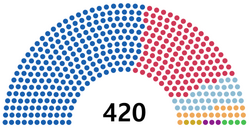National Assembly (Joseon)
National Assembly of the Great Kingdom of Joseon 대 조선왕국 국회 大朝鮮王國國會 | |
|---|---|
| Type | |
| Type | |
| Leadership | |
Speaker | |
Deputy Speaker | Park Hakyeon, Democratic Political Party |
Deputy Speaker | Ju Kiyoung, National Social Party |
| Structure | |
| Seats | 420 |
 | |
Political groups | Government (235)
Ruling coalition (34) Opposition (151)
|
Length of term | 4 years |
| Elections | |
| Parallel voting | |
Last election | 25 April 2024 |
Next election | April 2028 |
| Meeting place | |
 | |
| Main Conference Room National Assembly Building, Seoul | |
The National Assembly of the Great Kingdom of Joseon, often shortened to the National Assembly, is the unicameral national legislature of Joseon. The National Assembly has 420 seats, with 215 constituency seats and 205 proportional representation seats. The unicameral assembly consists of at least 320 members according to the Joseon democratic constitution. By law, candidates for election to the assembly must be at least 18 years of age.
National Assembly can be dissolved by the prime minister, and voluntarily dissolved early with the mutual consent of the National Assembly and the administration to hold a general election. However, in history, the National Assembly has never been dissolved by a prime minister.
Building
The main building in Yeouido, Seoul, is a stone structure with seven stories above ground and one story below ground. The building has 24 columns, which means the legislature's promise to listen to people 24/7 throughout the year.
Structure and appointment
Speaker
The constitution stipulates that the assembly is presided over by a Speaker and two Deputy Speakers, who are responsible for expediting the legislative process. The Speaker and Deputy Speakers are elected in a secret ballot by the members of the Assembly, and their term in office is restricted to two years. The Speaker and Deputy Speakers may not simultaneously be government ministers.
Negotiation groups
Parties that hold at least 20 seats in the assembly form floor negotiation groups, which are entitled to a variety of rights that are denied to smaller parties. These include a greater amount of state funding and participation in the leaders' summits that determine the assembly's legislative agenda.
Political parties with fewer than 20 seats can form a negotiation group through coalitions with other parties. These coalitions can be formed at any time, but they can also be broken up at any time, depending on the interests of each party.
Legislative process
For a legislator to introduce a bill, they must submit the proposal to the Speaker, accompanied by the signatures of at least ten other assembly members. A committee must then review the bill to verify that it employs precise and orderly language. Following this, the Assembly may either approve or reject the bill.
Committees
There are 17 standing committees which examine bills and petitions falling under their respective jurisdictions, and perform other duties as prescribed by relevant laws.
Election
The National Assembly has 420 seats and elects seats through a quadrennial general election. 215 seats are allocated as constituency seats and 205 seats are allocated as representation seats. Under the current constitution, any citizenship holder over the age of 18 can run for National Assembly.